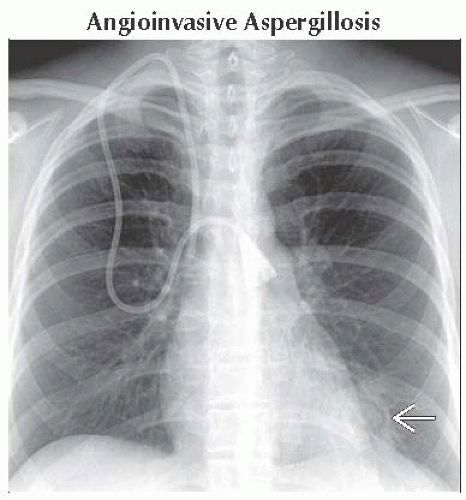Air-Crescent Sign
Robert B. Carr, MD
DIFFERENTIAL DIAGNOSIS
Common
Angioinvasive Aspergillosis
Mycetoma
Less Common
Bronchogenic Carcinoma
Rare but Important
Echinococcosis
ESSENTIAL INFORMATION
Key Differential Diagnosis Issues
Air-crescent sign: Air outlining edge of mass in sickle shape
Helpful Clues for Common Diagnoses
Angioinvasive Aspergillosis
Occurs in immunocompromised patients
Invades small arteries and often causes lung infarction
Begins as single or multiple lung nodules or areas of focal consolidation, often with associated halo sign
Cavitation occurs approximately 2 weeks later and is due to tissue necrosis
Necrotic tissue retracts and forms air crescent
Air-crescent sign is good clinical prognostic indicator as it indicates immune recovery phase
Mycetoma
Occurs in immunologically competent patients
Also called aspergilloma
Fungal ball usually caused by Aspergillus, as saprophyte
Forms within preexisting lung cavity or cyst
Inflammation can cause hemorrhage and hemoptysis
Rarely hematoma in cavity mimics mycetoma
Mass may shift with changes in position
Monod sign: Shifting of air crescent with changes in position, pathognomonic for mobile mass
Helpful Clues for Less Common Diagnoses
Bronchogenic Carcinoma
2 mechanisms of air crescent formation
Tumor may arise within preexisting cyst or cavity
Tumor itself may cavitate, forming crescent at margin
Not typical presentation
Helpful Clues for Rare Diagnoses
Echinococcosis
Caused by canine tapeworm
Pericyst: Compressed lung and fibrotic tissue
Ectocyst and endocyst: Layers of parasite
Pericyst rupture allows air between pericyst and ectocyst, forming air-crescent sign
Water lily sign: Floating endocyst caused by ectocyst rupture
Image Gallery
 Frontal radiograph shows a large mass in the left lower lung with a peripheral air-crescent sign
 . In this immunocompromised patient, this is highly suggestive of angioinvasive aspergillosis. . In this immunocompromised patient, this is highly suggestive of angioinvasive aspergillosis.Stay updated, free articles. Join our Telegram channel
Full access? Get Clinical Tree
 Get Clinical Tree app for offline access
Get Clinical Tree app for offline access

|